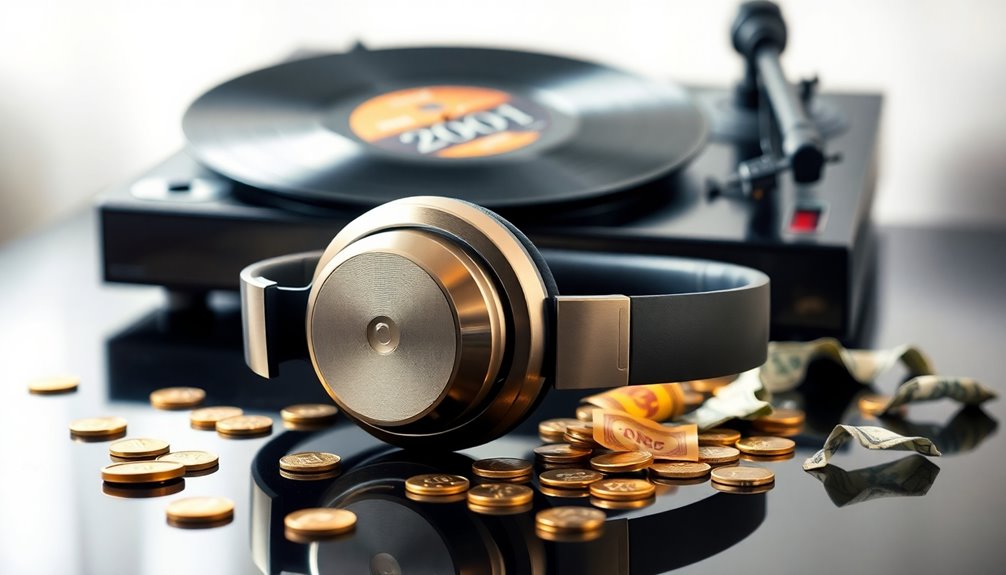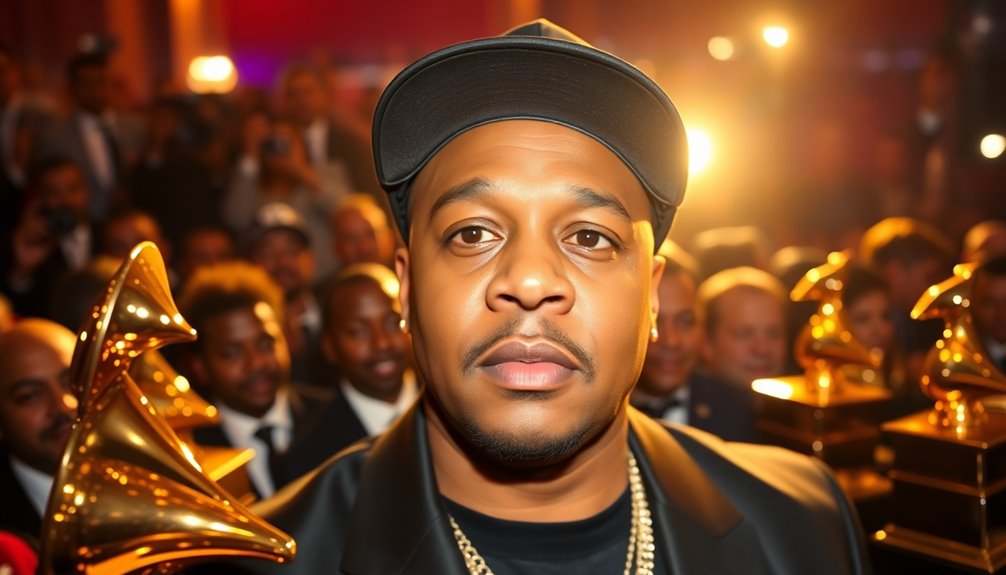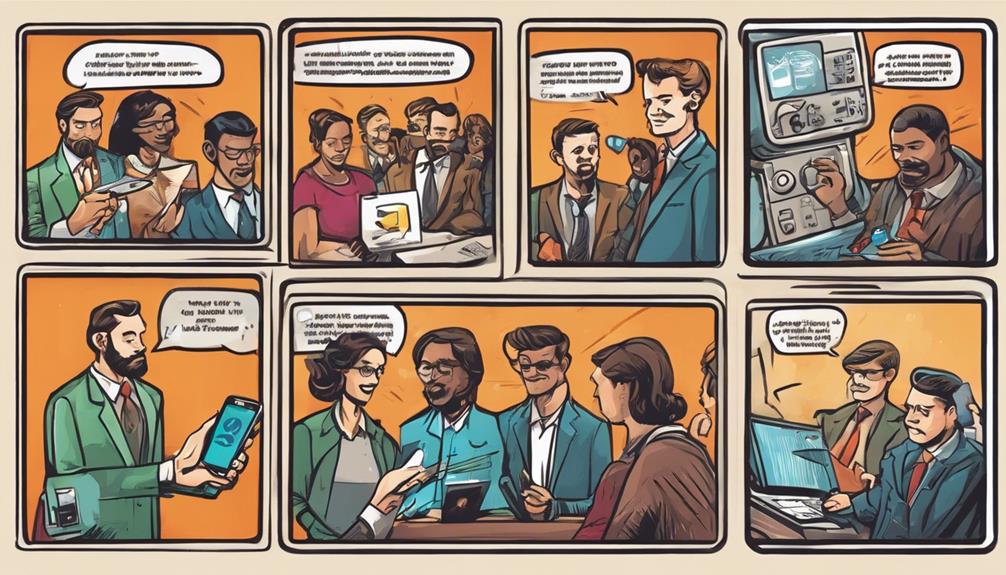Dr. Dre turned the music industry upside down with Beats Electronics, creating a brand synonymous with high-quality audio and luxury. Founded in 2006, Beats revolutionized how you perceive headphones, making them a fashion statement. The innovative marketing approach, capitalizing on hype culture, helped Dr. Dre sell the company to Apple for $3 billion in 2014. This move not only solidified his financial legacy but also changed how music and lifestyle intertwine. His influence extends beyond just sound; his community initiatives empower underserved youth in music. Stick around, and you'll discover more about his game-changing impact in the industry.
Key Takeaways
- Dr. Dre transformed audio quality standards with Beats, creating a premium headphone market that drove luxury consumerism in music accessories.
- The $3 billion sale of Beats to Apple in 2014 solidified Dr. Dre's status as a billionaire and reshaped the audio industry landscape.
- By collaborating with artists, Beats became synonymous with style, influencing consumer behavior and marketing strategies in the music and fashion industries.
- Dr. Dre's innovative production techniques and the success of his *2001* album laid the groundwork for modern hip-hop, impacting its commercial viability.
- Philanthropic efforts, including music education initiatives, reflect Dr. Dre's commitment to community while enhancing his brand's reputation and cultural significance.
Introduction

In 2006, Dr. Dre and Jimmy Iovine set out to revolutionize the audio industry by founding Beats Electronics. Initially, they contemplated launching a shoe line, but Iovine's suggestion to focus on speakers shifted the trajectory of their venture. They aimed to tackle the prevalent issue of poor sound quality that plagued existing headphones and earbuds. By collaborating with artists, they ensured that their products delivered high-quality sound that met the expectations of music lovers.
The development of their first product, Monster Beats by Dr. Dre Studio headphones, marked a significant milestone. Launched in 2008 for $350, these headphones became a symbol of luxury and style. They leveraged hype culture and sneaker culture in their marketing strategies, which resonated with consumers. The incorporation of varied colors and designs made the headphones even more appealing. Beats quickly became a leader in the premium headphone market as consumers sought out products that combined style with superior sound quality. Their success also paralleled the rise of caffeine content in espresso, as both trends became synonymous with modern lifestyle choices.
Beats also introduced Beats Audio software technology alongside their hardware, enhancing user experience. As the brand gained momentum, it transformed over-the-ear headphones from a niche product into a cultural phenomenon, leaving an indelible mark on pop culture and setting the stage for future successes.
Early Life and Background

Born Andre Romelle Young on February 18, 1965, Dr. Dre grew up in Compton, California, surrounded by music. His parents, Theodore and Verna Young, were both musicians, with Verna singing in the Four Aces and Theodore performing with The Romells. After their divorce, your mother remarried multiple times, bringing stepsiblings like Warren G into your life. You spent much of your early years in various neighborhoods across Compton, Carson, Long Beach, and South Central Los Angeles, primarily raised by your grandmother in the New Wilmington Arms housing project.
Your education was tumultuous; you started at Vanguard Junior High but switched to Roosevelt Junior High due to gang violence. You later attended Centennial High School and Fremont High School but struggled academically, even failing to qualify for an apprenticeship at Northrop Aviation. Following your mother's insistence, you enrolled in Chester Adult School and briefly attended a radio broadcasting school. Music called to you early on, influenced by Grandmaster Flash. You began as a DJ at Eve's After Dark under the name "Dr. J," later evolving into Dr. Dre, and formed the World Class Wreckin' Cru in 1984, recording local hits. This early experience in the music industry laid the groundwork for his later success with N.W.A and the gangsta rap genre.
Estimated Net Worth

Dr. Dre's estimated net worth stands at a remarkable $500 million as of 2024. This wealth primarily stems from the lucrative sale of Beats Electronics and various other business ventures. While he hasn't reached billionaire status, his financial portfolio showcases significant income streams and assets, consistently valued across multiple sources.
A major contributor to his net worth was the 2014 sale of Beats to Apple for $3 billion, which included $2.6 billion in cash and $400 million in stock. This deal positioned Dr. Dre as one of the wealthiest hip-hop artists, marking it as Apple's largest acquisition ever.
Additionally, in 2023, he sold a portion of his music catalog for over $200 million to Shamrock Holdings and Universal Music Group, generating nearly $10 million annually from these assets. His real estate portfolio, valued at around $80 million, further bolsters his financial standing, with properties in Los Angeles and Malibu. Notably, he is recognized as a savvy entrepreneur in addition to his music career, which further enhances his financial strategies. Profitable transactions, such as the sale of his Hollywood Hills home, highlight his savvy investment strategies. Overall, Dr. Dre's diverse assets solidify his impressive net worth and business acumen. Furthermore, his ability to create a budget and manage expenses effectively demonstrates the importance of maintaining financial health in personal budgeting strategies.
Lifestyle and Spending Habits

With a net worth that showcases impressive business acumen, Dr. Dre knows how to indulge in a luxurious lifestyle. You might be surprised to learn he owns a $400,000 Maybach and a private jet, perfect for his jet-setting lifestyle. His passion for high-end automobiles shines through in his extensive car collection, and he often invests in exclusive fashion items and jewelry, reflecting his taste for the finer things in life. Notably, his wealth has significantly increased, driven by the $500 million he earned from the Apple acquisition of Beats Electronics. Additionally, his preference for unique products mirrors the trend of consumers seeking high-quality sourcing from reputable producers.
Real estate is another area where Dr. Dre makes a statement. He boasts a $40 million estate in Brentwood, along with a $15.4 million home in the same neighborhood and a $2.2 million condo in Beverly Hills. His portfolio also includes a $4.5 million residence in the Palisades and a $2.5 million condo in Calabasas.
While he enjoys these luxuries, Dr. Dre also demonstrates a commitment to philanthropy. He's dedicated to supporting music education initiatives for underserved youth, balancing his opulent lifestyle with meaningful community involvement. Despite legal and financial challenges, including a $100 million divorce settlement, he manages his wealth astutely, ensuring his legacy continues to resonate in both music and philanthropy.
Iconic 2001 Album Release

Often regarded as one of the defining moments in hip-hop, the release of Dr. Dre's *2001* on November 16, 1999, redefined the genre's landscape. Initially set to be called *Chronic 2000*, the name change arose from legal conflicts, yet the album remained a powerful follow-up to his groundbreaking debut, *The Chronic*. As part of Aftermath Recordings and distributed by Interscope, *2001* showcased a polished sound, relying heavily on live instrumentation rather than samples. The album featured numerous collaborations, including notable contributions from various artists that enriched its appeal.
Commercially, the album was a massive success, achieving sextuple platinum status and selling over 7.6 million copies in the U.S. alone. It earned a GRAMMY nomination for Best Rap Album and helped solidify iconic tracks like "Still D.R.E." and "Forgot About Dre," the latter winning Best Rap Performance By a Duo or Group.
Critics praised *2001* for its immaculate production and cinematic feel, though some felt it couldn't quite match the impact of *The Chronic*. Regardless, it's celebrated as one of the best-selling hip-hop albums ever, marking a pivotal point in Dr. Dre's career and influencing countless artists, including a then-unknown Eminem.
Multiple Revenue-Generating Ventures

Beyond his legendary music career, Dr. Dre has built an impressive portfolio of revenue-generating ventures. As a co-founder of Death Row Records, he kickstarted the careers of icons like Snoop Dogg and Tupac Shakur. In 1996, he founded Aftermath Entertainment, signing major artists such as Eminem and 50 Cent. Selling a stake in Aftermath to Interscope for $35 million in 2001, he secured significant royalties from their music. As the current CEO, he continues to produce for top talents like Kendrick Lamar.
In 2006, Dr. Dre co-founded Beats Electronics with Jimmy Iovine, launching the Beats Studio headphones in 2008. Despite the recession, these headphones became a massive hit. He marketed the brand through strategic partnerships and product placements, ultimately selling Beats to Apple for a staggering $3 billion in 2014. This deal significantly boosted his net worth, reflecting his business acumen.
Further diversifying his portfolio, he co-produced the acclaimed film "Straight Outta Compton" and ventured into television, with more projects lined up. Additionally, he launched a music streaming service, Beats Music, and a gin brand with Snoop Dogg. With a real estate portfolio worth an estimated $80 million, Dr. Dre exemplifies the power of multiple revenue streams.
Grammy Awards and Nominations

Dre's nominations further demonstrate his influence. In 2016, he was nominated for Best Rap Album for "Compton," and in 2014, he was a contender for Album of the Year for Kendrick Lamar's "good kid, m.A.A.d city." His work on "I Need a Doctor" earned him nominations in 2012 for both Best Rap/Sung Collaboration and Best Rap Song. These accolades not only mark his individual success but also reflect his lasting impact on the music industry, cementing his legacy as a cultural icon. Additionally, his collaborations with renowned artists like Kendrick Lamar have further solidified his position in shaping modern hip-hop.
Legal Disputes Over Beats Brand

The legal disputes surrounding Beats, particularly between Beats Electronics and Monster, highlight the challenges that can arise in lucrative partnerships. In January 2015, Monster, led by CEO Noel Lee, sued Beats Electronics, Dr. Dre, and Jimmy Iovine, alleging fraud. They claimed Beats took control of the 'Beats By Dr. Dre' products and cut ties with Monster before selling to Apple for $3.2 billion. Monster co-designed the original headphones in 2008 and argued they lost millions while Beats profited.
In response, Beats filed a countersuit against Monster, asserting that their reputation was damaged by false statements made during contract negotiations in 2012 and 2013. Beats accused Monster of breaching their termination agreement, which included a clause forbidding future lawsuits or disparagement. This back-and-forth highlights the complexities of their contractual relationships. Notably, the trial for Monster's suit is scheduled for September 2016, which could further impact the ongoing disputes.
The disputes aren't limited to Monster. Beats faced other legal challenges, including a lawsuit from Bose that settled out of court and a $25.25 million award to Steven Lamar for his role in designing the headphones. These legal battles underscore the contentious nature of intellectual property and contractual agreements in the tech and entertainment sectors.
Community Empowerment Initiatives

Legal challenges may have shaped Beats' early narrative, but the brand has since pivoted towards community empowerment initiatives that resonate deeply with its audience. By addressing calls for greater equality and social justice, Beats connects with Gen Z while also appealing to a broader demographic. Their campaign, highlighted by a powerful two-minute video, asks, "You love Black culture, but do you love me?" This provocative question sparks reflection and encourages dialogue around racial inequality. The campaign's success is further underscored by its recognition in the Shorty Awards, which honors excellence in social media and digital content.
The campaign achieved impressive results, surpassing its view goals and ranking as one of Beats' most-watched videos. It not only garnered recognition from Adweek and Ad Age but also significantly boosted brand recall among viewers. Through these efforts, Beats fosters a sense of community, making individuals feel part of a larger movement.
Additionally, the Black Future Initiative empowers HBCU students by providing mentorship and hands-on experience in creative fields. This three-month paid program is designed to cultivate the next generation of Black creatives, leaders, and innovators. By promoting diversity and inclusion, Beats helps elevate Black voices, ensuring their representation in the creative industry is both valued and impactful.
Continued Brand Expansion Plans

Beats is committed to continued brand expansion, focusing on diversifying its product offerings and enhancing its market presence. You'll notice that the brand has expanded its headphone lines, introducing models like Beats Solo, Beats Studio, and Powerbeats, each with multiple generations to cater to different customer needs. The integration of Apple's W1 chip in products such as Beats Solo 3 Wireless ensures seamless pairing and extended battery life, enhancing user experience.
Moreover, Beats has embraced noise cancellation technology, with features like Pure Adaptive Noise Cancelling in Beats Studio 3 Wireless. The introduction of true wireless earbuds, like Beats Studio Buds and Powerbeats Pro, caters to convenience-driven consumers. Additionally, portable speakers like the Beats Pill and Beats Pill+ broaden the audio solution range.
Beats is also expanding into music streaming, having acquired MOG, which evolved into Beats Music. This move diversified revenue streams through a subscription-based model. Strategic partnerships, such as collaborations with automakers and HP, have further solidified Beats' market presence. With a focus on innovation and cultural impact, Beats is set to redefine its brand identity while continuing to resonate with consumers. The brand's reputation is built on hip-hop culture and celebrity endorsements, enhancing its appeal in the market.
Legacy of Music Innovation

Throughout the history of music production, Dr. Dre has left an indelible mark through his pioneering techniques. You can hear the impact of G-funk in hip-hop, with its heavy basslines and smooth melodies that Dre perfected. He adeptly layered sounds, creating rich, immersive tracks that set new standards in the industry. By utilizing synthesizers and drum machines, he transformed the soundscape of hip-hop, while also incorporating live instrumentation for added depth.
Dre revolutionized digital sampling, blending diverse elements to create unique compositions that pushed musical boundaries. His meticulous sampling techniques inspired countless musicians to explore new sonic territories. When it came to vocal performances, his innovative use of Auto-Tune enhanced tracks, streamlining the recording process and setting a high bar for vocal quality. Furthermore, his pioneering use of synthesizers allowed for the creation of distinctive sounds that became a signature of his productions.
Moreover, Dre transformed the recording studio experience, integrating hardware and software for seamless workflows. His introduction of multi-track recording and new mixing techniques expanded creative possibilities. By fostering a comfortable studio environment, he encouraged collaboration and artistic freedom. All these innovations have solidified Dr. Dre's legacy as a true pioneer who continually reshaped the music industry.
Frequently Asked Questions
What Inspired Dr. Dre to Create Beats Headphones?
You might find Dr. Dre was inspired to create Beats headphones because he was frustrated with the poor sound quality in the music industry. After witnessing the rise of low-fi mp3s and cheap earbuds, he wanted to restore the true essence of music. By identifying a gap in the market for premium audio, he collaborated with industry experts, focusing on delivering a high-quality listening experience that modern music fans crave.
How Did Beats Impact the Headphone Market?
Beats transformed the headphone market by blending music culture with innovative design. You've likely noticed their bold aesthetics, which made headphones not just audio devices but fashion statements. Their strategic marketing and collaborations increased visibility, driving consumer adoption. With products like the Beats Studio Buds, they captured a significant market share, appealing to both Android and iPhone users. Overall, Beats shifted how you perceive and experience headphones, making them a lifestyle choice.
What Role Did Apple Play in Beats' Success?
Apple played a crucial role in Beats' success by providing vast resources and a global distribution network. When you look at the acquisition, it allowed Beats to leverage Apple's marketing channels to reach more customers than ever before. By integrating Beats Music into Apple Music, you saw enhanced streaming options, which attracted more users. Plus, with Apple's commitment to innovation, Beats continued to evolve, maintaining its strong brand identity in the competitive audio market.
How Does Dr. Dre's Music Influence Modern Artists?
Dr. Dre's music profoundly influences modern artists by setting new standards in hip-hop production. You'll notice his signature G-funk style, with smooth melodies and deep basslines, shaping countless tracks today. His mentorship has empowered artists like Eminem and 50 Cent, encouraging them to innovate and push boundaries. When you listen to contemporary hip-hop, you can hear Dre's impact in the beats, lyrical delivery, and overall production quality that define the genre.
What Philanthropic Efforts Has Dr. Dre Undertaken?
You might be surprised by Dr. Dre's extensive philanthropic efforts. He's donated $100 million to Compton High School, funding a new campus and performing arts center. He's also partnered with Jimmy Iovine to establish the USC Academy for Arts, Technology, and Business Innovation. Beyond education, he supports various charities focusing on health and poverty. By emphasizing the importance of resources for young people, he aims to inspire the next generation of innovators and artists.









